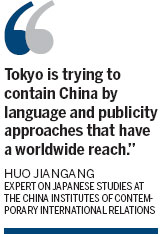Beijing dismisses Japan's 'radar lock' media report

The Ministry of National Defense has rejected the Japanese media's latest "hype" over the alleged naval "radar lock-on" incident and warned of a hidden agenda behind Tokyo's recent reports.
In the latest chapter of the radar "drama", the Tokyo-based Kyodo News Agency released an article on Sunday quoting unnamed Chinese officials who reportedly admitted to "locking radar on Japanese ships".
Beijing previously dismissed the allegation as groundless, while the ministry denied the Kyodo report, reiterating on Monday that "the facts are clear".
Sino-Japanese ties have been strained by the deadlocked Diaoyu Islands row since September.
In early February, Japanese Defense Minister Itsunori Onodera heightened tension by claiming that a Chinese navy vessel had "locked its fire-control radar" on a Japanese destroyer in the East China Sea in late January.
The accusations have tarnished the image of China's military and misled international public opinion because of Japan's "ulterior motives", the ministry said.
Japanese warships and aircraft have for a long time closely followed, monitored and disturbed Chinese naval ships and aircraft, according to the ministry.
Huo Jiangang, an expert on Japanese studies at the China Institutes of Contemporary International Relations, said Tokyo has resorted to a series of groundless allegations, especially the "radar" incident, to accuse China of being responsible for "escalating the tension" and "violating international norms".
"Tokyo is trying to contain China by language and publicity approaches that have a worldwide reach," Huo warned.
Japan should maintain China-Japan ties with practical action and deeply reflect on the practice instead of making irresponsible comments, the ministry said.
Tension between the two largest Asian economies continued on Monday, as China marine surveillance vessels continued regular patrols in the waters off the islands on Monday, the Japanese coast guard said.
Meanwhile, hawkish Japanese Prime Minister Shinzo Abe and his key Cabinet members have made more tough remarks that may upset Japan's neighbors.
Despite Abe's claim on Sunday that he hopes to soon meet with the leaders of China and the Republic of Korea to improve relations strained by separate territorial disputes, his ruling Liberal Democratic Party also pledged on the same day to push for changes to Japan's pacifist Constitution.
The Constitution's revision has long been viewed as a move "likely to stir unease" in Japan's Asian neighbors, including China and the ROK, which were among the victims of Tokyo's 20th-century militarism, Reuters commented.
Japanese Chief Cabinet Secretary Yoshihide Suga said on Monday that Tokyo stressed the importance of the "strategic and mutually beneficial relationship", but Tokyo hasn't changed its persistent stance of denying the existence of the Diaoyu Islands row.
Yang Bojiang, an expert on Japanese studies at the Chinese Academy of Social Sciences, warned about Japan's dubious vow of enhancing the "strategic and mutually beneficial relationship" between Japan and China.
"Given Abe's series of attempts to whitewash Japan's militarist past, including denying the country's wartime deeds of forcing Asian women into sexual slavery, we should have a closer look and doubt Tokyo's sincerity" about improving ties, Yang said.
Japan is "vulgarizing" the concept of the "strategic and mutually beneficial relationship", Yang warned.
Abe also warned against ongoing "provocations" against Japanese territory and said the Japanese Self-Defense Forces are facing "a crisis of the here and now," when addressing a Sunday graduation ceremony at the National Defense Academy, Japan's NHK Television reported.
Japanese Defense Minister Itsunori Onodera referred on Saturday to China's maritime presence when he underlined the necessity of enhancing the armed forces.
Liu Yedan and Xinhua
contributed to this story.
zhangyunbi@chinadaily.com.cn
(China Daily 03/19/2013 page12)














